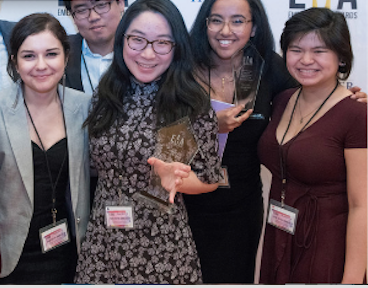


Thursday night, March 22, the 4th Annual Emerge Media Awards (EMAs) garnered its most significant number of attendees to date. The calibre of nominees was at its best, leading Canada’s only media award program devoted to journalism, media studies and communications students to sell out at The Assembly Hall on the Lakeshore Humber campus.
Musician and author Dave Bidini, founder of West End Phoenix, was this year’s keynote speaker, and the ceremony was hosted by Julian Klimczyk, a University of Guelph-Humber graduating student in the Digital Communication discipline. There were about 40 judges who pored over 260 entries from colleges and universities across Canada fighting to be nominated. Eight awards were handed out.
The 2018 winners:
- Written Word: Josie Kao – University of Toronto – “Data In A Foreign Land” [pictured front, centre, photo above]
- Audio Storytelling: Trent Erickson, Will Gordon, Cameron Honey, Aviva Jacob, Danielle McCreadie, Nermeen Ramadan, Jayde Tynes – University of Kings College – “What If The Halifax Explosion Never Happened?”
- Videography: Caitlin Taylor, Jennifer Ackerman, Janelle Blakley, Josh Diaz – University of Regina – “Severed”
- Multimedia Production: Jolene Rudisuela, Amy Simpson, Lexi Wright – Mount Royal University – “Closing Midfield”
- Photography: Cody Bonner – Mohawk College – “From Above”
- Public Relations: Jason Lau – McMaster University – “Canada is the world.”
- Design-Print: Elham Numan, Pearl Cao, Piyumi Konara, Keith Cheng – University of Toronto – “The Varsity Fall Magazine: The Futures Issue”
- Design-Online: Seher Asaf, Francesca Bianco, Sophie Gray, Yusheng Cai, Haley Lewis, Emma Loy, Holly McKenzie-Sutter, Sharon Nadeem, Andrew Seal, Taranjit Singh, Alex Migdal and Anya Zoledziowski – University of British Columbia – Tém:éxw: “Stories Of Land.”
Administered and organized by the University of Guelph-Humber, this was the first time the program was held outside the Guelph-Humber campus. Kathy Ullyott, Assistant Program Head for Media Studies and manager of the EMAs, says the show has evolved ten-fold since it was launched, along with the conference, in 2015. “There are more schools who enter,” Ullyott says. “We have more submissions; we have more people attending.”
Producing both the one-day conference and the awards ceremony is the capstone project for the graduating class; the students call it the “the Emerge experience.” At the ceremony, Jerry Chomyn, Program Head of Media Studies, concluded his welcome address by saying, “We don’t need more people, we need better people.” To echo Ullyott, he said that the award show has quickly become the focal point of the conference.
He stated the acknowledgement of student work is what draws the media industry’s next generation of content creators: “Every year, [the quality] is going up. I think people are seeing what others are doing and it’s upping their game. Competition is good.”
Although attendance was high, Ullyott thinks the college strike in the fall may have affected the number of submissions. She said that “There are a lot of colleges in Ontario and they traditionally enter a lot of submissions. I did notice we had many more universities this year, fewer colleges – fewer Ontario colleges – and I wonder if maybe students didn’t have the same volume of work or their profs who generally do the submissions were too rushed cleaning up after the strike. I don’t know; I have no idea.”
Guelph-Humber student Benjamin Eppel was one of the Executive Directors for the Emerge Conference and EMAs. He said their rough start with technical difficulties was due to changes regarding their venue, traditionally held at The Rose Garden Banquet Hall & Convention Centre, but the challenges paid off.
“There’s nothing that teaches you quite like a panic every week for a whole semester, Eppel states, a graduating Public Relations student in Media Studies. “New unknowns every single week where you have to take the skills you learned in class and then use them times a hundred.”
The end-of-semester project has also added to their work experience and etiquette, two desirable components that lead to employment past post-secondary. Eppel says, “Eighty-percent of it is showing up. The people who show up, you start to remember those classmates, and that’s really important going to the working world. You start to remember who was putting in the work throughout and you start to notice them and learn from them.”
There is hope that the growing popularity of the EMAs will lead to a more considerable collaborative effort with other universities and colleges.
To view the EMA finalists, click here.
